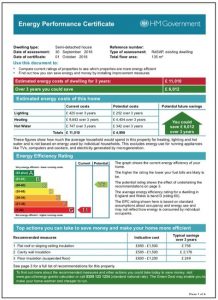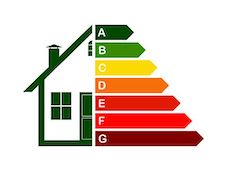Tenant Rights in London (EPC)
Your Legal Entitlement to an Energy Performance Certificate (EPC)
 If you’re planning to rent a home in London, whether it’s a sleek studio in Shoreditch or a family house in Richmond, it’s important to know your rights. One of the most essential documents you’re legally entitled to as a tenant is an Energy Performance Certificate (EPC).
If you’re planning to rent a home in London, whether it’s a sleek studio in Shoreditch or a family house in Richmond, it’s important to know your rights. One of the most essential documents you’re legally entitled to as a tenant is an Energy Performance Certificate (EPC).
At Ripple Survey Solutions Ltd, we work with tenants, landlords, property managers, and letting agents across London to ensure rental properties are compliant, energy-aware, and legally sound. In this blog, we break down what an EPC is, why it matters, and what you should do if you haven’t received one.
What Is an EPC (Energy Performance Certificate)?
 An EPC is a legal document that rates a property’s energy efficiency on a scale from A (most efficient) to G (least efficient).
An EPC is a legal document that rates a property’s energy efficiency on a scale from A (most efficient) to G (least efficient).
Each EPC includes:
- The current energy rating of the property
- An estimate of energy costs
- Recommendations for improving energy efficiency and reducing bills
An EPC also outlines:
- The environmental impact rating (how much CO₂ the property is likely to emit)
- A summary of factors affecting efficiency, such as the age of the building, construction materials, heating systems, and insulation
Do Landlords in London Have to Provide an EPC?
 Yes. Under the Energy Performance of Buildings Regulations 2012, all landlords in London, and throughout England and Wales, are legally required to provide tenants with a valid EPC before signing a tenancy agreement.
Yes. Under the Energy Performance of Buildings Regulations 2012, all landlords in London, and throughout England and Wales, are legally required to provide tenants with a valid EPC before signing a tenancy agreement.
This includes rental properties across all boroughs: Camden, Croydon, Harrow, Hackney, Islington, Westminster, Lambeth, and beyond.
Under the Minimum Energy Efficiency Standards (MEES) introduced in 2018:
- Landlords cannot legally rent out a property with an EPC rating below E, unless the property qualifies for a registered exemption.
- Since October 2015, failing to provide a valid EPC may prevent landlords from serving a Section 21 eviction notice—a serious legal consequence.
Key Legal Obligations for Landlords
- EPCs must be provided free of charge
- EPCs must be valid (issued within the last 10 years)
- Not required if renting to a lodger (someone sharing the landlord’s home)
- Sublease holders must ensure the EPC is still valid
When Should You Receive an EPC?
 An Energy Performance Certificate (EPC) is a legal requirement for nearly all rented properties in the UK, and tenants have a legal right to receive one before moving in. This isn’t just a formality; it’s an essential document that protects the tenant, informs their choices, and ensures transparency between landlord and tenant.
An Energy Performance Certificate (EPC) is a legal requirement for nearly all rented properties in the UK, and tenants have a legal right to receive one before moving in. This isn’t just a formality; it’s an essential document that protects the tenant, informs their choices, and ensures transparency between landlord and tenant.
Here’s why receiving an EPC before tenancy begins is so important:
It’s a Legal Requirement
Under the Energy Performance of Buildings (England and Wales) Regulations 2012, landlords must provide a valid EPC:
- Before a tenancy agreement is signed
- Before the tenant takes possession of the property
If the landlord fails to do so, they could face fines and may not be able to legally serve a Section 21 eviction notice later.
It Helps Tenants Understand Energy Costs
An EPC gives tenants a clear picture of:
- How energy-efficient the property is
- What they can expect in terms of heating and utility bills
- Recommendations for improvements that could reduce future costs
 This information is crucial when budgeting for monthly expenses, especially in areas like London where energy bills and rent are already high.
This information is crucial when budgeting for monthly expenses, especially in areas like London where energy bills and rent are already high.
It Confirms the Property Is Legal to Rent
Since April 2018, it has been illegal for landlords to let most residential properties with an EPC rating of F or G, unless an exemption has been officially registered.
By checking the EPC in advance, tenants can confirm that the property meets the Minimum Energy Efficiency Standards (MEES) and is legally lettable.
It Supports Greener Living
Tenants who care about sustainability and energy efficiency can use the EPC to:
- Compare properties before choosing one
- Make informed decisions about the environmental impact of their living situation
It Promotes Transparency and Fairness
The EPC ensures that all parties are informed about the condition and performance of the property from the outset. It builds trust and helps avoid disputes later—especially over issues like heating performance, insulation, or damp.
In Summary
 A tenant must receive an EPC before taking up tenancy because:
A tenant must receive an EPC before taking up tenancy because:
- It’s a legal obligation for landlords
- It enables tenants to make informed decisions
- It confirms the property is compliant and safe to rent
- It helps tenants’ budget accurately and live more sustainably
Before signing any agreement or collecting keys, tenants should ask for the EPC, or check it themselves on the EPC Register.
If you haven’t received one at any of these stages, the landlord or agent may be in breach of UK housing regulations.
Why Should London Tenants Care About EPCs?
London’s rental market is one of the most expensive in the UK.
Understanding a property’s energy efficiency helps tenants protect their finances and the environment. Here’s why it matters:

- Lower Bills – Homes with poor energy ratings (E–G) cost more to heat and run
- Greener Living – Higher-rated homes (A–C) reduce carbon emissions
- Know Your Rights – Homes rated F or G are illegal to rent unless exempt
How to Check a Property’s EPC
You don’t need to wait for a landlord to provide the EPC—you can check it yourself online:
https://www.gov.uk/find-energy-certificate
Search the Government EPC Register
Simply enter the property’s London address to view the EPC rating, expiry date, and recommendations for improvements.
What to Do If You Don’t Receive an EPC
If your landlord or agent doesn’t provide an EPC:

Step 1: Request it in Writing
Politely ask your landlord or letting agent and remind them of their legal obligation.
Step 2: Report Non-Compliance
If they fail to respond, contact your local Trading Standards office in your borough.
Step 3: Seek Advice
Organisations such as Shelter, Citizens Advice, or local tenants’ rights groups can help you escalate the issue.
Checklist: What to Do If You Don’t Get an EPC
- ☐ Ask your landlord or agent for it
- ☐ Check the EPC register online
- ☐ Contact Trading Standards if it’s missing
- ☐ Get legal support from a housing charity
Take Action: Protect Your Rights
For Tenants:
Before signing any agreement or moving in, make sure you’ve received a valid EPC. It’s not just best practice—it’s the law.
For Landlords & Agents:
If you’re letting property in London, a valid EPC is non-negotiable. Non-compliance can lead to fines and legal restrictions.
Need an EPC in London?
At Ripple Survey Solutions Ltd, we provide fast, accurate, and fully certified EPC surveys for landlords, estate agents, and property managers across Greater London.
Contact Us Today] to book your EPC or learn more about compliance.

